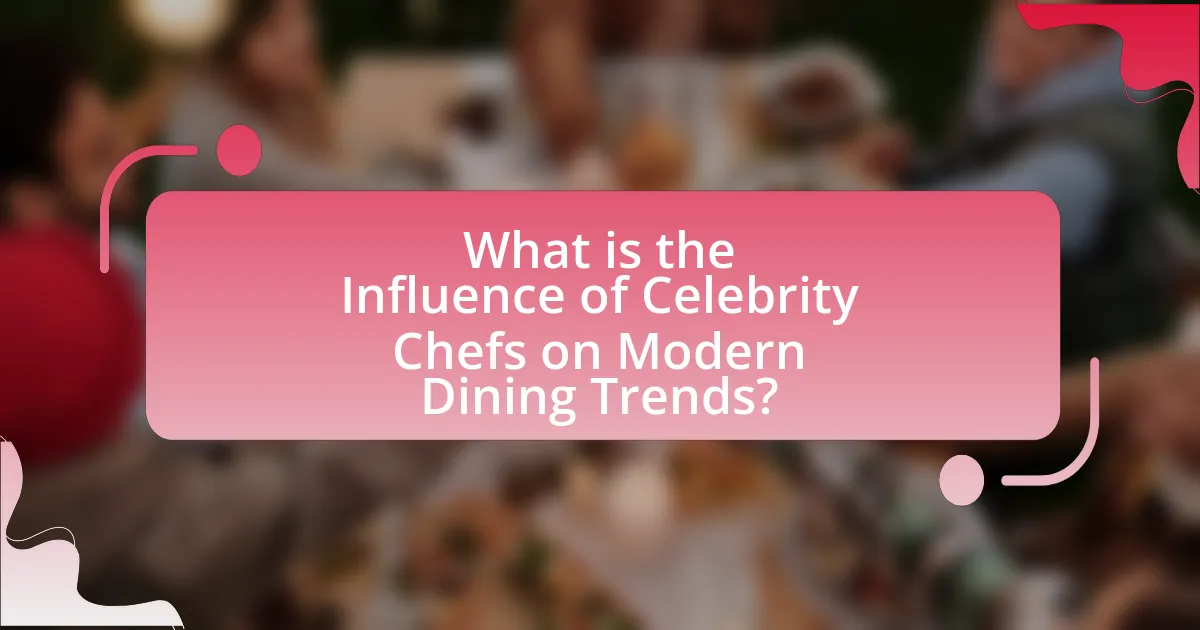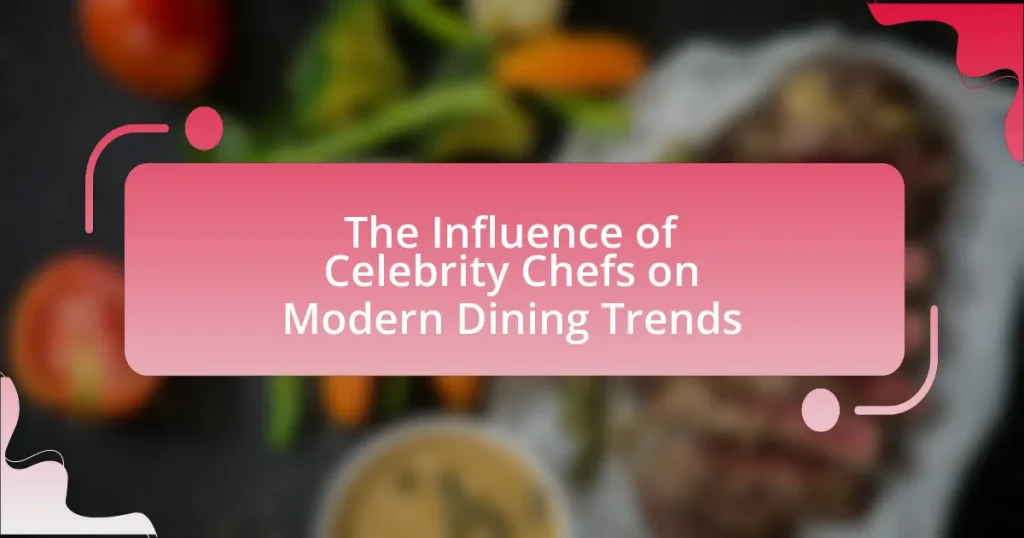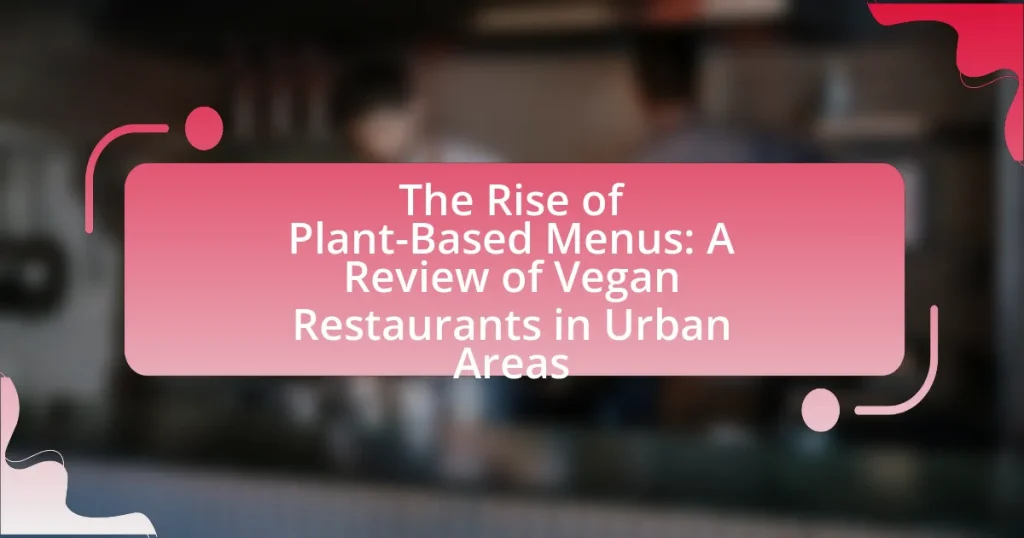The article examines the significant influence of celebrity chefs on modern dining trends, highlighting how their visibility through media shapes consumer preferences and culinary practices. It discusses the transformation of dining from a basic necessity to an experiential event, driven by cooking shows and social media engagement. The piece also explores how celebrity chefs set culinary standards, impact restaurant menus, and promote sustainability, while addressing potential downsides such as the overshadowing of local culinary talent. Additionally, it outlines emerging trends in dining, including plant-based cuisine and experiential dining, and offers practical tips for aspiring chefs based on the practices of these influential figures.

What is the Influence of Celebrity Chefs on Modern Dining Trends?
Celebrity chefs significantly influence modern dining trends by shaping consumer preferences and culinary practices. Their visibility through television shows, social media, and cookbooks popularizes specific cuisines, cooking techniques, and food presentation styles. For instance, the rise of farm-to-table dining can be attributed to chefs like Alice Waters, who emphasized local and sustainable ingredients, leading to a broader movement towards organic and ethically sourced food. Additionally, celebrity chefs often introduce innovative dishes that become viral sensations, such as the cronut by Dominique Ansel, which can drive restaurant menus and consumer demand. Their endorsements and personal brands also impact food product sales, as seen with chefs like Gordon Ramsay, whose name on a product can significantly boost its marketability.
How have celebrity chefs changed the perception of dining?
Celebrity chefs have significantly transformed the perception of dining by elevating it from a basic necessity to an experiential and cultural event. This shift is evidenced by the rise of cooking shows, such as “Top Chef” and “MasterChef,” which have popularized gourmet cooking and made culinary skills aspirational. Additionally, celebrity chefs like Gordon Ramsay and Julia Child have introduced innovative techniques and diverse cuisines to mainstream audiences, fostering a greater appreciation for food quality and presentation. Their influence has also led to the proliferation of food-related social media content, which emphasizes dining as a form of entertainment and lifestyle, further reshaping consumer expectations and experiences in restaurants.
What role do celebrity chefs play in shaping culinary standards?
Celebrity chefs play a significant role in shaping culinary standards by setting trends, elevating food presentation, and influencing public perceptions of cuisine. Their prominence in media, such as television shows and social media platforms, allows them to introduce innovative cooking techniques and diverse culinary styles to a broad audience. For instance, chefs like Gordon Ramsay and Jamie Oliver have popularized high-quality ingredients and sustainable practices, which have become benchmarks in the industry. Additionally, their endorsement of specific cuisines or cooking methods often leads to increased consumer demand and restaurant offerings that align with these elevated standards, thereby impacting culinary education and professional practices.
How do celebrity chefs influence consumer expectations in restaurants?
Celebrity chefs significantly influence consumer expectations in restaurants by setting high standards for food quality, presentation, and dining experiences. Their television appearances and social media presence create a perception that dining should be an exceptional experience, often characterized by innovative dishes and unique culinary techniques. For instance, a study published in the Journal of Consumer Research found that consumers are willing to pay more for meals associated with celebrity chefs, indicating that their brand and reputation elevate consumer expectations. This influence extends to menu design, service style, and overall ambiance, as restaurants strive to replicate the high standards established by these culinary figures.
Why are celebrity chefs considered trendsetters in the culinary world?
Celebrity chefs are considered trendsetters in the culinary world because they significantly influence food trends, dining experiences, and consumer preferences. Their visibility through television shows, social media, and cookbooks allows them to introduce innovative cooking techniques, unique flavor combinations, and new cuisines to a broad audience. For instance, chefs like Gordon Ramsay and Jamie Oliver have popularized concepts such as farm-to-table dining and healthy eating, which have reshaped consumer expectations and restaurant menus. This influence is evidenced by the rise of culinary events and food festivals that often feature these chefs, further solidifying their role in shaping modern dining trends.
What specific trends have emerged from celebrity chefs’ influence?
Celebrity chefs have significantly influenced several trends in modern dining, including the rise of gourmet food trucks, the popularity of cooking shows, and the emphasis on local and sustainable ingredients. Gourmet food trucks have emerged as a trendy dining option, offering high-quality meals in casual settings, reflecting the chefs’ ability to innovate and adapt traditional recipes. Cooking shows, popularized by celebrity chefs, have increased public interest in home cooking, leading to a surge in culinary classes and cooking-related content online. Additionally, the focus on local and sustainable ingredients has grown, as chefs advocate for farm-to-table practices, promoting environmental awareness and supporting local economies. These trends demonstrate the profound impact celebrity chefs have on consumer preferences and dining experiences.
How do celebrity chefs utilize social media to promote dining trends?
Celebrity chefs utilize social media to promote dining trends by showcasing innovative recipes, engaging with followers, and collaborating with brands. They leverage platforms like Instagram and TikTok to share visually appealing content, which attracts attention and influences consumer preferences. For instance, a study by the Journal of Culinary Science & Technology found that 70% of consumers are inspired to try new dishes after seeing them on social media, highlighting the significant impact celebrity chefs have on dining trends.

What are the key factors contributing to the rise of celebrity chefs?
The key factors contributing to the rise of celebrity chefs include the proliferation of food media, the increasing popularity of cooking shows, and the growth of social media platforms. Food media, such as television programs and online content, have created a platform for chefs to showcase their skills and personalities, making them household names. Cooking shows, particularly competitive formats like “Top Chef” and “MasterChef,” have captivated audiences, leading to a surge in public interest in culinary arts. Additionally, social media platforms like Instagram and TikTok allow chefs to engage directly with fans, share recipes, and promote their brands, further enhancing their visibility and influence in the culinary world. These elements collectively contribute to the phenomenon of celebrity chefs, transforming them into influential figures in modern dining trends.
How has television impacted the popularity of celebrity chefs?
Television has significantly increased the popularity of celebrity chefs by providing a platform for them to showcase their culinary skills and personalities to a wide audience. Cooking shows, such as “MasterChef” and “Top Chef,” have not only entertained viewers but also created a cultural phenomenon around cooking, making chefs household names. According to a 2020 survey by the National Restaurant Association, 70% of consumers reported being influenced by celebrity chefs when choosing dining options, highlighting their impact on consumer behavior. This visibility has led to increased demand for their cookbooks, restaurants, and branded products, further solidifying their status in popular culture.
What types of cooking shows have the most influence on dining trends?
Cooking shows featuring celebrity chefs, particularly those that emphasize competition and innovative culinary techniques, have the most influence on dining trends. Programs like “Top Chef” and “MasterChef” showcase high-stakes cooking challenges and creative dishes, which inspire viewers to explore new cuisines and cooking styles. Research indicates that these shows significantly impact consumer behavior, with a 2019 study by the Journal of Culinary Science showing that 70% of viewers reported trying new recipes or dining experiences after watching such programs.
How do cooking competitions contribute to the celebrity chef phenomenon?
Cooking competitions significantly contribute to the celebrity chef phenomenon by providing a platform for chefs to showcase their skills and gain public recognition. These competitions, such as “Top Chef” and “MasterChef,” attract large audiences and create a competitive environment that highlights culinary talent. As chefs compete, they often develop unique personal brands, which can lead to increased media exposure, cookbook deals, and restaurant opportunities. For instance, according to a 2020 report by the National Restaurant Association, 70% of consumers are influenced by celebrity chefs when dining out, indicating that these competitions play a crucial role in shaping public perception and trends in the culinary world.
What role does branding play in the success of celebrity chefs?
Branding is crucial for the success of celebrity chefs as it establishes their identity and differentiates them in a competitive market. A strong brand allows chefs to create a loyal customer base, enhance their visibility, and expand their influence beyond the kitchen. For instance, chefs like Gordon Ramsay and Rachael Ray have successfully leveraged their brands to launch restaurants, cookbooks, and television shows, significantly increasing their revenue streams. Research indicates that effective branding can lead to a 20% increase in customer loyalty and a 30% boost in sales for culinary businesses, underscoring the importance of branding in the culinary industry.
How do celebrity chefs create a personal brand that resonates with audiences?
Celebrity chefs create a personal brand that resonates with audiences by leveraging their unique culinary styles, engaging storytelling, and strong social media presence. These chefs often showcase their distinctive cooking techniques and flavors, which helps them stand out in a crowded market. For instance, Gordon Ramsay’s fiery personality and high standards attract viewers and followers who appreciate his authenticity and expertise. Additionally, they connect with audiences through relatable narratives about their culinary journeys, making their brands more approachable. Social media platforms, such as Instagram and TikTok, allow these chefs to share visually appealing content and interact directly with fans, further solidifying their brand identity. According to a study by the Journal of Consumer Research, personal storytelling enhances brand loyalty, indicating that the narratives celebrity chefs share significantly contribute to their resonance with audiences.
What marketing strategies do celebrity chefs use to enhance their influence?
Celebrity chefs enhance their influence through strategic branding, social media engagement, and collaborations with food-related brands. They create a strong personal brand by developing unique culinary identities that resonate with audiences, often reflected in their signature dishes and cooking styles. Social media platforms, particularly Instagram and YouTube, serve as vital tools for celebrity chefs to showcase their culinary skills, share recipes, and connect with fans, leading to increased visibility and engagement. Collaborations with food brands, restaurants, and cooking shows further amplify their reach, allowing them to leverage established audiences and enhance their credibility in the culinary world. For instance, celebrity chefs like Gordon Ramsay and Rachael Ray have successfully utilized these strategies to build extensive media empires, significantly impacting modern dining trends.

How do celebrity chefs impact restaurant menus and dining experiences?
Celebrity chefs significantly influence restaurant menus and dining experiences by introducing innovative culinary techniques and trends. Their prominence in media creates a demand for unique dishes that reflect their personal style, leading restaurants to adapt menus to attract customers seeking these experiences. For instance, the rise of farm-to-table concepts and fusion cuisine can be traced back to celebrity chefs who popularized these movements, such as Alice Waters with her emphasis on local ingredients. Additionally, the visibility of celebrity chefs through television and social media platforms enhances customer expectations for quality and presentation, prompting restaurants to elevate their dining experiences to meet these standards.
What types of cuisine have gained popularity due to celebrity chefs?
Celebrity chefs have significantly popularized cuisines such as Italian, French, and Asian fusion. For instance, chefs like Mario Batali and Giada De Laurentiis have brought Italian cuisine into mainstream American dining, while French chefs like Alain Ducasse have elevated French culinary techniques and dishes. Additionally, Asian fusion, popularized by chefs like Roy Choi, has introduced a blend of traditional Asian flavors with Western cooking styles, leading to widespread acceptance and enthusiasm for these cuisines. The rise of cooking shows and social media has further amplified this trend, making these cuisines more accessible and appealing to a broader audience.
How do celebrity chefs introduce innovative cooking techniques to the public?
Celebrity chefs introduce innovative cooking techniques to the public through television shows, social media platforms, and cookbooks. These mediums allow chefs to demonstrate new methods, such as sous-vide cooking or molecular gastronomy, in an engaging and accessible manner. For instance, shows like “MasterChef” and “Top Chef” showcase these techniques in competitive formats, making them appealing to a broad audience. Additionally, social media platforms like Instagram and YouTube enable chefs to share quick tutorials and visually captivating content, further popularizing these techniques. According to a 2021 survey by the National Restaurant Association, 70% of consumers reported trying new cooking techniques after seeing them demonstrated by chefs online, highlighting the significant impact celebrity chefs have on public cooking practices.
What are the implications of celebrity chef-inspired menus for traditional dining establishments?
Celebrity chef-inspired menus significantly impact traditional dining establishments by shifting consumer expectations towards innovative and unique culinary experiences. These menus often emphasize high-quality ingredients, creative presentation, and distinctive flavor combinations, compelling traditional restaurants to adapt or enhance their offerings to remain competitive. For instance, a study by the National Restaurant Association in 2022 indicated that 70% of diners are influenced by celebrity chefs when choosing where to eat, highlighting the importance of these figures in shaping dining preferences. Consequently, traditional establishments may need to incorporate elements of celebrity chef cuisine, such as seasonal menus or signature dishes, to attract and retain customers, ultimately transforming their operational strategies and marketing approaches.
How do celebrity chefs influence food sustainability and sourcing practices?
Celebrity chefs significantly influence food sustainability and sourcing practices by promoting local, organic, and ethically sourced ingredients through their platforms. Their visibility encourages consumers to prioritize sustainable options, as seen in initiatives like the “Farm to Table” movement, which emphasizes direct sourcing from local farms. For instance, chefs such as Alice Waters have been pivotal in advocating for sustainable agriculture, leading to increased awareness and demand for organic produce. Additionally, celebrity chefs often collaborate with sustainable brands and participate in campaigns that highlight the importance of reducing food waste, further shaping public perception and behavior regarding food sourcing.
What initiatives have celebrity chefs taken to promote sustainable dining?
Celebrity chefs have initiated various programs to promote sustainable dining, including farm-to-table practices, advocacy for local sourcing, and educational campaigns on food waste reduction. For instance, chefs like Alice Waters have championed the farm-to-table movement, emphasizing the importance of using locally sourced ingredients to reduce carbon footprints and support local economies. Additionally, chefs such as Dan Barber have implemented initiatives that focus on sustainable agriculture and biodiversity, showcasing the benefits of seasonal eating. These efforts are often supported by partnerships with organizations like the James Beard Foundation, which promotes sustainable food practices through awards and educational programs.
How do celebrity chefs educate consumers about food sourcing and quality?
Celebrity chefs educate consumers about food sourcing and quality through various platforms, including television shows, cookbooks, and social media. These chefs often emphasize the importance of using fresh, locally sourced ingredients, which they showcase in their recipes and cooking demonstrations. For instance, chefs like Alice Waters advocate for farm-to-table practices, highlighting the benefits of seasonal produce and sustainable farming methods. This approach not only informs consumers about where their food comes from but also encourages them to make informed choices regarding food quality. Additionally, celebrity chefs frequently collaborate with local farmers and producers, further promoting transparency in food sourcing and fostering a connection between consumers and their food supply.

What are the potential downsides of celebrity chef influence on dining trends?
The potential downsides of celebrity chef influence on dining trends include the promotion of unrealistic culinary standards and the overshadowing of local cuisine. Celebrity chefs often set high expectations for food presentation and quality, which can lead to disappointment among diners when their experiences do not match these ideals. Additionally, the focus on celebrity-driven trends can divert attention from traditional and regional dishes, causing a decline in the appreciation for local culinary heritage. This phenomenon can result in homogenization of dining experiences, where unique local flavors are replaced by generic, trend-driven offerings.
How can the focus on celebrity chefs overshadow local culinary talent?
The focus on celebrity chefs can overshadow local culinary talent by diverting public attention and media coverage away from regional chefs and their unique offerings. Celebrity chefs often dominate food media, leading to a perception that their restaurants and styles are the pinnacle of culinary excellence, which diminishes the visibility of local chefs who may offer authentic and innovative dishes rooted in local culture. For instance, a study by the National Restaurant Association found that 70% of diners are influenced by celebrity endorsements, which can result in local establishments struggling to attract customers despite their culinary skills and contributions to the community. This dynamic creates an imbalance where the culinary landscape is shaped more by celebrity status than by the diverse talents present in local food scenes.
What challenges do traditional chefs face in a celebrity-driven market?
Traditional chefs face significant challenges in a celebrity-driven market, primarily due to the overshadowing popularity of celebrity chefs who dominate media attention and consumer preferences. This environment creates a disparity in visibility and marketing resources, making it difficult for traditional chefs to attract customers despite their culinary skills and experience. Additionally, the trend towards celebrity chefs often emphasizes entertainment over culinary expertise, leading to a devaluation of traditional cooking methods and practices. As a result, traditional chefs may struggle to maintain their identity and relevance in a landscape that prioritizes celebrity status over authentic culinary artistry.
How does the commercialization of food culture affect authenticity in dining?
The commercialization of food culture significantly diminishes authenticity in dining by prioritizing profit over traditional culinary practices. As restaurants and food brands increasingly cater to mass markets, they often simplify or alter recipes to appeal to broader audiences, leading to a loss of regional and cultural specificity. For instance, the rise of fast-casual dining chains has resulted in standardized menus that dilute the unique flavors and techniques of authentic cuisines. Research indicates that this trend can lead to a homogenization of food experiences, where local dishes are modified to fit commercial viability, ultimately undermining the cultural heritage they represent.
What are the future trends in dining influenced by celebrity chefs?
Future trends in dining influenced by celebrity chefs include a focus on sustainability, plant-based cuisine, and experiential dining. Celebrity chefs are increasingly promoting sustainable practices, such as sourcing local ingredients and reducing food waste, which aligns with growing consumer demand for environmentally friendly dining options. Additionally, the rise of plant-based diets is being championed by chefs like Matthew Kenney and Isa Chandra Moskowitz, who create innovative dishes that appeal to both vegans and omnivores. Experiential dining, where the meal is part of a larger sensory experience, is also gaining traction, as seen in the success of immersive dining events led by chefs like Grant Achatz. These trends reflect a shift towards health-conscious, environmentally aware, and engaging dining experiences, driven by the influence of celebrity chefs.
How might technology further change the role of celebrity chefs in dining trends?
Technology will further change the role of celebrity chefs in dining trends by enhancing their ability to engage with audiences and influence consumer preferences through digital platforms. With the rise of social media and streaming services, celebrity chefs can showcase their culinary skills, share recipes, and promote dining experiences to a global audience instantly. For instance, platforms like Instagram and YouTube allow chefs to create visually appealing content that can go viral, shaping food trends and consumer behavior rapidly. Additionally, advancements in artificial intelligence and data analytics enable chefs to understand consumer preferences better, allowing them to tailor their offerings to meet evolving tastes. This shift is evidenced by the increasing popularity of online cooking classes and virtual dining experiences, which have surged during the pandemic, demonstrating how technology can redefine the interaction between chefs and diners.
What emerging culinary movements are being shaped by celebrity chefs today?
Celebrity chefs are shaping several emerging culinary movements today, including plant-based cuisine, fusion cooking, and sustainable dining. These chefs leverage their platforms to promote plant-based diets, as seen with figures like Gordon Ramsay and his recent focus on vegan recipes, reflecting a growing consumer demand for healthier, environmentally friendly options. Additionally, the trend of fusion cooking, which combines elements from different culinary traditions, is popularized by chefs like Roy Choi, who blends Korean and Mexican flavors, showcasing the versatility and creativity in modern cuisine. Lastly, the emphasis on sustainability is evident through chefs like Dan Barber, who advocate for farm-to-table practices and local sourcing, aligning with the increasing consumer awareness of food origins and environmental impact.
What practical tips can aspiring chefs learn from celebrity chefs?
Aspiring chefs can learn essential skills such as mastering knife techniques, understanding flavor profiles, and the importance of presentation from celebrity chefs. Celebrity chefs often emphasize the significance of precision in cutting, which enhances both safety and efficiency in the kitchen. For example, Gordon Ramsay frequently showcases his knife skills in cooking shows, demonstrating how proper technique can elevate a dish. Additionally, celebrity chefs like Ina Garten highlight the importance of balancing flavors, teaching aspiring chefs to experiment with herbs and spices to create depth in their dishes. Lastly, the visual appeal of food is underscored by chefs like Wolfgang Puck, who illustrates that presentation can significantly impact a diner’s experience, making it crucial for aspiring chefs to focus on plating techniques.















